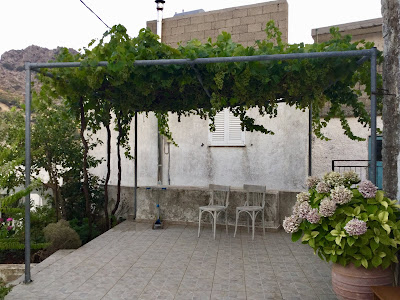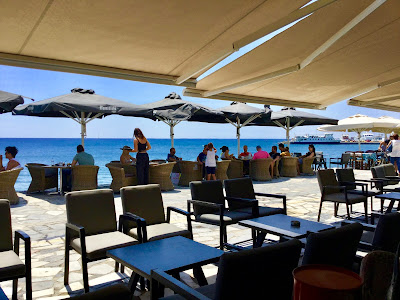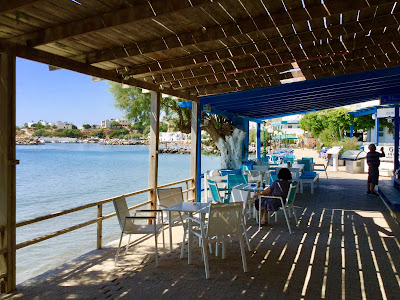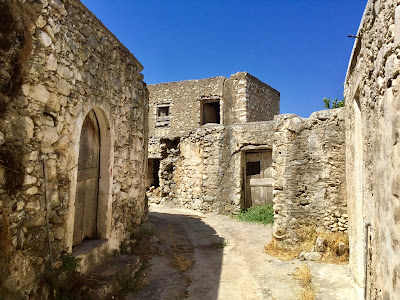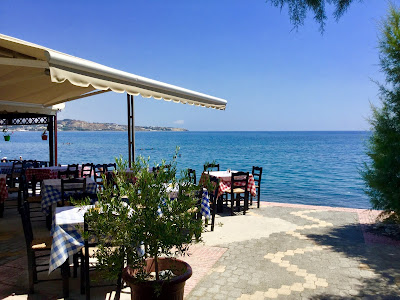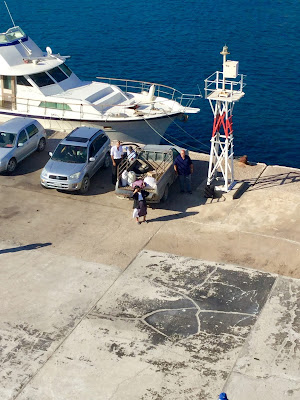I'm furious.
The other evening we went down for a swim on our regular beach. Aa we swam along, our attention was drawn to a couple, both of whom were rather on the large side (no offense!), who were paddling around just a few feet into the water. They had a pair of those plastic li-los laying on the beach with the rest of their 'stuff.' It was quite a windy evening, with the wind coming off of the land.
I must admit to being one of those who sees red whenever I see inflatable plastic li-los and the like, especially as the flippin' things weigh next to nothing and can so easily be picked up by the wind when left unattended.
No one could have failed to notice that plastic pollution, especially in the oceans, is a very hot potato right now. Who hasn't seen news reports of whales being found dead, having choked on plastic bags, turtles being strangled by those collars that six packs of beer often come in, fishing line cutting into a dolphin's flesh? The list is endless. There's even a floating plastic mass, reputedly as big as Wales, floating around in the Pacific Ocean.
So am I alone in wondering why these disgusting rubbishy li-los are still allowed? Maybe I'm simply an old grouch, but I sincerely believe that they should be banned, made illegal, at least from beaches. I can illustrate my point with what happened next.
As we swam past this couple, one of their li-los was picked up by the wind from the beach behind them, it then flew past them and out on to the surface of the sea. Within seconds it was a hundred metres out and moving swiftly away from the shore. What did these two caring and environmentally aware people do? The watched it and laughed. The two of them laughed, as 'hubby' pointed with one index finger while shading his eye with the other hand. Hilarious, eh? Another choking whale before long I shouldn't wonder.
As we watched in horror (and I should point out that if I'd been twenty years younger I may have had a go at this myself), but as we watched the offending couple chortling as they single-handedly added a few metres of plastic waste to the ocean, a socially responsible man who'd been splashing about in the shallows nearby, set off at as quick a pace as he could master, swimming the crawl, to try and catch the offending item. I well remember some years ago when I'd done something similar when someone's ridiculously lightweight beach ball had gone bounding off across the surface of the water on Skiathos. I'd swum for all my might, but had to give up when I could see that the ball was travelling much quicker than I. As I turned dejectedly around to head back to shore, I was shocked at how far out I'd gone. I made it back, but not without becoming very exhausted.
Now, this chap who'd gone after the li-lo did appear to be gaining on it for a while, that is until a gust of wind lifted the li-lo from the water and started it cartwheeling out to sea much faster still. In the end, like me some years ago, he had to give it up as a bad job, but we could see from a distance that he'd truly spent himself, as his strokes had slowed and eventually ceased as he began to tread water to get his strength back for the return swim to shore. I'm not exaggerating when I say that we both became concerned that he'd not be able to make it back from sheer exhaustion. The man could have drowned, all because of a couple of irresponsible idiots who couldn't bear to go to the beach without carting this plastic disaster along with them.
As the li-lo continued to cartwheel on out to sea, a speed boat came along towing a few screaming holidaymakers in one of those rubber ring-type things.
"Ah ha!" we both said, "Maybe he'll stop for a second and retrieve it." Huh. As they say in Yorkshire, "Did 'e 'eck as like?" The driver of the speed boat just kept roaring past, when he could very easily have positioned himself downwind of the offending object and intercepted it.
Never mind, now a jet-ski came charging along the surface of the sea, travelling in the direction of the li-lo. Maybe this bloke would try and retrieve the thing. He did appear for a second or two to consider it, as his speed lessened and that huge jet of water that often spouts out from behind a jet-ski lessened to a limp gurgle. But no, he too was apparently not concerned enough to make the effort.
I have to admit to being so dismayed by such sights that I can't tear my eyes off of them until the errant object is lost to view. All the while feeling desperately upset at yet more plastic crap being allowed to pollute the already suffering seas. I only have to walk past a tourist shop in a resort, and I become thoroughly depressed at the huge amounts of plastic on display for holidaymakers to buy. Sometimes you can hardly see the front of the store for li-los of all shapes and sizes (the latest craze is those big pink swans), not to mention inflatable beach balls, cheap umbrellas and all the rest.
The couple who had owned the flyaway li-lo simply carried on splashing around once their lost li-lo was too far out to be seen by the naked eye. I almost considered making a citizen's arrest.
Seriously, though, am I the only person (well, I should say "are we the only two" since my wife agrees 100% on this) who thinks that it's about time legislation was introduced to prevent thick people from parading down to the world's beaches with objects that are far too likely to add to the world's pollution problem than they are to be carried back home again after a session on the shoreline?
What truly depresses me is the thought that, for every li-lo or beach ball that I personally see flying off to add to the oceans' woes, how many times is the scenario being repeated the world over? Would it really detract so much from people's enjoyment of a day on the beach to not be able to bring such pollutive 'accidents waiting to happen' with them?
As I said, I'm furious. Simply can't help it.





